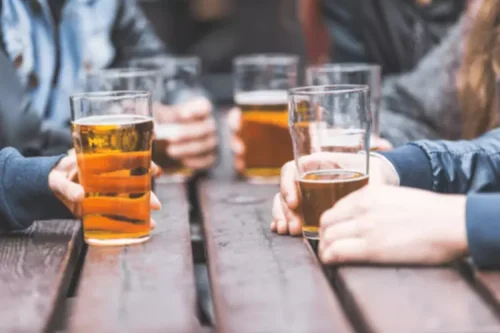
Acibadem Healthcare Group, a leading healthcare institution, specializes in the diagnosis and treatment of neurological conditions like essential tremor and offers comprehensive support and treatment options. It is important to note that the extent to which alcohol triggers symptom episodes varies from person to tremor improves with alcohol person. Some individuals may experience a significant increase in tremor activity after consuming even small amounts of alcohol, while others may have more tolerance. Understanding one’s own tolerance and observing the relationship between alcohol consumption and tremors is essential to manage essential tremor effectively. While alcohol may exacerbate essential tremors, it is important to understand that abstaining from alcohol altogether is not the only solution. Treatment options for essential tremor include medication, physical therapy, and lifestyle modifications, all of which can be explored with the guidance of healthcare professionals.
Why Does Alcohol Help Essential Tremor?

By implementing these essential tremor prevention tips, you can take proactive steps towards reducing the likelihood of developing this condition. Remember that prevention is key, and maintaining a healthy lifestyle can have a positive impact. While alcohol and caffeine do not directly cause essential tremor, they can trigger and exacerbate tremor episodes.
- Alcohol tremors can be debilitating and can make doing simple daily tasks much more difficult.
- Ensure that you stay hydrated by drinking plenty of water alongside alcohol consumption.
- While many people experience significant improvement after the procedure, others may still have some degree of shaking or other symptoms.
- Some subjects experienced tremor reduction as long as 5+ hours, with the effect gradually wearing off.
- It’s important to listen to your body, recognize your limits, and adjust your alcohol intake accordingly.
- Understanding how fast a tremor oscillates (its frequency) can be an important diagnostic tool.
Are there any types of alcoholic beverages that are safer for people with essential tremor?
The neurostimulator sends electrical impulses to the thalamus, which can help reduce or eliminate tremors in some people with essential tremor. The level of stimulation can be adjusted by a healthcare provider to what is Oxford House find the optimal settings for each individual. By identifying and avoiding these triggers, individuals with essential tremor may be able to manage their symptoms more effectively and improve their quality of life. Stress is a well-known trigger for many neurological conditions, including essential tremor. When you’re stressed, your body releases hormones such as adrenaline and cortisol that can increase heart rate and blood pressure. Liver dysfunction from chronic alcohol consumption has a direct effect on the brain.
- Alcohol acts as a depressant, initially inducing feelings of relaxation and euphoria.
- It is generally recommended that individuals with essential tremor limit their alcohol consumption or avoid it altogether to prevent worsening of symptoms.
- Rapid drug detox accelerates withdrawal with medication to cleanse the body, offering quicker recovery but requiring ongoing therapy and aftercare for long-term success.
- Figure 1 illustrates the classic Archimedes spiral of ET—note the maximal tremor amplitude at an axis of 60° characteristic of the disorder.
Alcohol Rehab Success Rate: Factors That Influence Treatment Outcomes
- They can monitor your progress, evaluate any potential adverse effects, and make necessary adjustments to your treatment plan.
- The first-in-class Cala Trio therapy offers individualized treatment for hand tremors with a wrist-worn device that sends electrical stimulation to nerves in the wrist.
- Pharmacokinetik analysis of OA showed a tmax at 72.8 min, a relatively large volume of distribution (389 L), and an elimination half-life of 83.5 min.
Before trying any alternative therapy for essential tremor, it’s important to talk to your doctor and do your own research to ensure its safety and effectiveness. The exact cause of essential tremor is not fully understood, but it is believed to be a combination of genetic and environmental factors. Several possible causes have been proposed, including abnormalities in certain brain structures and imbalances in brain chemicals. Experiencing alcohol tremors is a sign that something more serious may be going on, but stopping alcohol use may feel impossible right now. Alcohol rehab will give you the tools needed to leave alcohol behind and take back control of your physical and mental health. Guided therapies, skill-building courses, and physical evaluations will all be a part of your path to recovery.

The authors hypothesized that the causes of the diminishing effect may be multifactorial, including diminishing lesion size, reduction in perilesional edema, or inaccurate targeting. A prospective, multicenter, randomized trial also reported sustained benefit at two year follow-up, with 62% of patients showing a 50% improvement in tremor rating. Mild progression of tremor and disability scores was seen between years one and two.170 Adverse reactions are summarized in table 2. In a small double blind, placebo controlled trial, nimodipine was dosed at 30 mg four times daily to 16 patients with essential tremor.
- In the accompanying video segment and video legend, we present select patient responses to EtOH or sodium oxybate; these video segments illustrate robust improvements, understanding that mild or moderate improvements are more typical.
- Some studies have suggested that alcohol can worsen tremors in people with essential tremor, while others have found no significant link.
- Responders (29 female; 39 male) had a median age of 66.5 (57.8–72) at time of consent, a median age of tremor onset of 20 (12–47.2), and median tremor duration of 36 (17.8–50.2) years.
- Consultation with a healthcare professional can provide further guidance tailored to individual needs.
If you are considering alcohol therapy for essential tremor, it is crucial to seek professional medical advice. Consulting with experts who have experience in essential tremor management can provide you with the guidance and expertise needed to make informed decisions about your treatment plan. Therefore, it is essential for individuals considering alcohol therapy to approach it with caution and in consultation with healthcare professionals.
Current Treatment Options for Essential Tremor
A condition known as hepatic encephalopathy (HE) is a serious and life-threatening result of alcohol-related liver disease. Symptoms of HE include sleep disturbances, mood alterations, severe cognitive changes such as losing attention span, anxiety, depression, and asterixis – a specific flapping hands type of tremor. These factors collectively compromise the body’s ability to absorb, store, and utilize thiamine, creating deficiency and increasing the risk of WE and KS. Symptoms include motor disabilities affecting gait, eye muscle impairment, speech muscle loss, and memory impairment. Administering thiamine and refraining from alcohol consumption reduces the symptoms of WE, though permanent brain damage can occur.

Managing Essential Tremor with Alcohol Consumption
When alcohol is consumed, it can have a variety of effects on the body, including changes in metabolism and liver function. These changes can interfere with the way medications are metabolized and absorbed, potentially reducing their effectiveness in managing essential tremor symptoms. Consult your essential tremor specialist or healthcare provider about alcohol consumption. They can provide personalized advice based on your specific condition, medication regimen, and overall health. They may also recommend adjustments to your treatment plan to accommodate your alcohol consumption.

Diagnostic SubtletiesSome patients with tremor presenting to the office have tremors that are unusual or difficult to classify. Patients with ET may present in several ways that can confuse the inexperienced examiner. Patients may present with an isolated tremor of the voice, with no head tremor or action tremor of the hands. More challenging, others present with an isolated tremor at rest that mimics a parkinsonian rest tremor but without bradykinesia or cogwheeling. These patients may be misdiagnosed with PD, although dopaminergic imaging studies are usually negative.
-768x399.png)
 Oh My God! Saver Pack
Oh My God! Saver Pack 


















-APG-450x450.jpg)

 - APG-450x450.jpg)

-APG-450x450.jpg)


